- Home
- William Maxwell
Ancestors Page 6
Ancestors Read online
Page 6
With other candidates, Stone was examined before the Presbytery. The examiner was very short and indefinite on the subject of the Trinity, and didn’t go into the peculiarities of the system—“Doubtless,” Stone says, “to prevent debate on the subject in Presbytery, and to maintain peace among its members.”
Before the next session, at which time Stone would be licensed to preach, he was again in a depressed state. He had totally run out of money, and none of his relatives was willing to help him. His mind was “embarrassed by many abstruse doctrines, which I admitted as true; yet could not satisfactorily reconcile with others which were plainly taught in the Bible.” He decided to give up the idea of preaching, and collected his last resources of money—amounting to fifteen dollars—and started alone for the state of Georgia, where he had a brother. Halfway in his journey he was seized with a violent fever. Being scarce of money and among strangers, he decided to keep on. The fever rose so high that he became delirious and was found by a philanthropist—that is to say, a kind man—sitting on his horse, which was feeding by the side of the road. The philanthropist took him home and put him to bed, and the next morning Stone resumed his journey, and arrived at his brother’s house in Oglethorpe County, where he was sick for several months.
Through the influence of his brother he got a job as professor of languages in a Methodist school. “Men of letters were few at that time, especially in that part of the world, and were regarded with more than common respect. The marked attention paid me by the most respectable part of the community was nearly my ruin”—meaning that he went to parties and so enjoyed himself that he found suddenly that his religious devotion was cold and his communion with God much interrupted. So he took up, instead, with a Mr. Springer, a very zealous Presbyterian preacher, whose discourses made Stone begin to feel a strong desire again to preach the gospel. A great many Frenchmen who had fled from the Reign of Terror landed in Georgia and one of them was teaching in the school. Stone resumed his study of French. It was characteristic of him that while the passionate side of his nature was attempting to deal with his religious uncertainty, another side proceeded quietly along, learning because he liked to. Later on, when a similar opportunity presented itself, he picked up a reading knowledge of Hebrew.
Having finished the year out, he went back to North Carolina, appeared before the Presbytery, and was licensed to preach. Stone and a friend named Foster rode off together, both with appointments to preach in the southern part of the state, but before the first Sunday came around, Foster confessed that he did not feel qualified for the solemn work of preaching the gospel and had decided not to do it any more. Hearing his own doubts expressed by someone he considered in every way his superior was too much for poor Stone. He waited until Foster was out of the house and then got on his horse and started for Florida, where nobody would know him. After a few miles he turned aside from this journey to attend a meeting, and there he met an acquaintance—an opinionated old lady, who suspected his intentions, told him plainly that she feared he was acting the part of Jonah, solemnly warned him of the danger, and advised him, since he disliked the southern part of North Carolina, to go over the mountains, to the West.
That evening when he went back to the meeting, there was Foster in the congregation. Though he had given up preaching, he had not given up hearing others do it. After upbraiding Stone for leaving him, Foster decided to go west also. They were in the country of strangers, on the other side of the mountain, and both in a very low state of mind, when a man ran out of a small house on the road to Fort Chiswell and hailed them. It was another acquaintance, from North Carolina, and nothing would do but that the two young men must arrest their journey long enough to preach at the Presbyterian meetinghouse. Both refused, but agreed to stay and attend the meeting. Stone was prevailed on to ascend the pulpit. While singing and praying, he found that his mind was happily relieved and that he was enabled to speak with boldness, and with profit to the people.
This congregation and several others in the vicinity were without anybody to preach to them, and they entreated Stone to abide with them a while. He lingered, preaching, through May and June, and then started west again. At Knoxville he went to the house of rendezvous for travelers journeying through the wilderness to Nashville, and found only two men there, waiting for company. Against his better judgment he started off with them. One was a large, coarse backwoodsman and Indian fighter of great courage. The other was the greatest coward Stone had ever seen. Crossing the Clinch River at sunset, they were discovered by fifteen or twenty Indians about a hundred yards away, on the edge of a canebreak. The Indians sprang up, and the travelers spurred their horses and did not stop till they were at the foot of Cumberland Mountain. Here they turned off the road, and in the thick brushwood tied their horses and lay down on their blankets. “Being much fatigued I slept so soundly that I did not perceive a shower of rain, which had awakened the other two, and driven them off to seek shelter. At length I awoke, and missed my company. Everything was profoundly silent, except the wolves and foxes in the mountain. My feelings were unpleasant. I almost concluded that the Indians had surprised them, and that they had fled. I remembered that the same God who had always protected me, was present, and could protect me still. To him I humbly commended myself, laid down again, and securely slept through till day, when I saw my companions about a hundred yards off, sheltered by a large tree. I blamed them for leaving me thus exposed to the ravening beasts around.”
He soon had another and more substantial reason to blame them. In climbing the mountain that morning, Stone’s horse lost a shoe, and went lame. He asked the backwoodsman to let him ride his pack horse and put the pack on Stone’s. The request was refused. Stone trotted after his horse, until he was overcome by weariness. The other two rode off, leaving him alone in the wilderness. Taking his time and driving the horse in front of him, he arrived at a settlement, where he was kindly received and rested several days and then he proceeded to Shiloh, where he found many old friends and fellow students lately come home from North Carolina. With one of them Stone made an agreement to travel and preach “through all the settlements of Cumberland.” This didn’t take very long, for the settlements were all within a few miles of Nashville, which was at that time a village. The two young men went on to Kentucky, and there continued their itinerant preaching until winter set in. The united congregations at Cane Ridge and Concord, in Bourbon County, were at that time vacant, and Stone preached to them. He was invited to settle. Though he was young, his preaching was correct and interesting. And he himself was very much liked. He endeavored to preach the truth as he found it in the Bible, and seldom made any direct allusion to or attack on the sentiments or doctrines of those who differed from him. When he was not preaching he applied himself closely to reading and study. Within a few months he had added fifty members to the congregation at Concord and thirty at Cane Ridge, and he concluded that it was better to stay in one place than to exhort here and there, among strangers.
In the fall of 1798 a call from his two congregations was presented to him through the Presbytery of Transylvania, and he accepted, knowing that the Presbytery would have to pass on his suitability, and also would require him to agree to the Westminster Confession of Faith as the system of doctrines taught in the Bible. The Westminster Confession is the official creed of the Church of Scotland and, with some changes, of most Presbyterian churches and also of Congregationalists. It is the work of an assembly of divines, examined and approved in 1647 by the General Assembly of Scotland, and ratified by Act of Parliament in 1649. It begins in grandeur, as one would expect of a serious prose work of the mid-17th century. “There is but one only living and true God, who is infinite in being and perfection, a most pure spirit, invisible, without body parts or passions, immutable, immense, eternal, incomprehensible, Almighty, most wise, most holy, most free, most absolute …” But after a few pages the harsh climate, the mists, and the dampness of Calvinism begin to pervade both the thinking
and the language. “All those whom God hath predestined into life, and those only, he is pleased in his appointed and accepted time effectually to call by his word and Spirit, out of that state of sin and death in which they are by nature … Others not elected, although they may be called by the ministry of the word, and may have some common operation of the spirit; yet they truly never come to Christ, and therefore cannot be saved: much less can men not possessing the Christian religion, be saved in any other way whatsoever, be they never so diligent to frame their lives according to the light of nature, and the laws of that religion they do possess, and to assert and maintain, that they may, is very pernicious and to be detested.”
Stone began to study the Confession carefully, and, as usual he stumbled at the doctrine of the Trinity. Doubts also arose in his mind on the doctrines of election, reprobation, and predestination. “I had before this time learned from my superiors the way of divesting those doctrines of their hard, repulsive features, and admitted them as true, yet unfathomable mysteries. Viewing them as such, I let them alone in my public discourses, and confined myself to the practical part of religion, and to subjects within my depth. But in reexamining these doctrines, I found the covering put over them could not hide them from a discerning eye with close inspection. Indeed, I saw they were necessary to the system without any covering.”
Before the Presbytery convened, Stone took two of the members aside and “made known to them my difficulties, and that I had determined to decline the ordination at that time. They labored, but in vain, to remove my difficulties and objections. They asked me how far I was willing to receive the confession? I told them, as far as I saw it consistent with the word of God. They concluded that was sufficient. I went into Presbytery and when the question was proposed, ‘Do you receive and adopt the Confession of Faith, as containing the system of doctrine taught in the Bible?’ I answered aloud, so that the whole congregation could hear, ‘I do, as far as I see it consistent with the word of God.’ No objection being made I was ordained.”
He was twenty-four years old.
He continued to be nagged by doubts, which he labored to repel as Satanic temptations. Nevertheless, as he was addressing his congregations on the doctrine of total depravity and the necessity of the physical power of God to produce faith, and at the same time urging them to repent and believe the gospel, his zeal would be chilled at the contradiction. For how could they believe? How could they repent unless it was God’s sovereign will and pleasure that they should repent? How could they do impossibilities? And how could they be guilty in not doing them? “Such thoughts would almost stifle utterance, and were as mountains pressing me down to the shades of death.” He tried to take refuge in the distinction between natural and moral ability and inability, but by whatever name it was called that inability was in the sinner, and therefore he could not believe, or repent, but must be damned.
* The Biography of Elder Barton Warren Stone written by himself, with Additions and Reflections by Elder John Rogers (Cincinnati, 1847).
4
Stone resolved not to declare his views publicly until he felt able to defend them. He read the Bible. He retired to the solitude of the woods and sank down on his knees. At the thought of a God who, professing great love for his children, would punish them for not carrying out impossible commands, blasphemy rose in his heart and he was tempted to utter it. Sweat burst from the pores of his body. He prayed for the ruined world.
In his parish and in the rest of Kentucky, life went on quietly. His own passionate feelings met with no response. Preaching from the pulpit at Cane Ridge or at Concord, he was aware of a universal apathy, as if the powers of religion had disappeared and even the form of it was fast waning away.
At the end of the 18th century the Protestant church was completely given over to sectarianism. There were five kinds of Baptists and six kinds of Presbyterians—in the American wilderness, where congregations were small and poor and widely scattered and for the most part dependent on itinerant preachers. Only one person in ten belonged to any church whatever. Among the Presbyterians, a minister of one branch was not acceptable to any of the other five, and weeks passed during which it was impossible to hold a service or take communion. The presbyteries and synods were powerful and suspicious, and the slightest deviation from the Westminster Confession was sufficient to bring about a minister’s expulsion from the church.
Faith and reason being of no avail, the scrupulous person waited, often in vain, for convincing proof—a dream, a vision, a voice, an uncommon appearance of light—that he had arrived at belief through the direct action of God. In his autobiography Stone cries out, “Let me here speak when I shall be lying under the clods of the grave. Calvinism is among the heaviest clogs on Christianity in the world. It is a dark mountain between heaven and earth …” Suddenly a way around the mountain was revealed—the tidal wave of religious interest and excitement that in later years came to be known as the Great Western Revival. It began about 1800, lasted three years, and was confined almost entirely to Kentucky and Tennessee. The meetings had to be held out of doors, at some church rather than in it, for no church was large enough. And the guiding spirit and principal evangelist was that beady-eyed, gravel-voiced Presbyterian, James McGready, whose preaching had so upset Stone in his youth.
In Mrs. Trollope’s Domestic Manners of the Americans there is an account of a Methodist camp meeting in the backwoods of Indiana, in 1829, that in appearance and in spirit would not have been very different from those a generation earlier. “The spot chosen was the verge of an unbroken forest, where a space of about twenty acres appeared to have been partially cleared for the purpose. Tents of different size were pitched very near together in a circle round the cleared space; behind them were ranged an exterior circle of carriages of every description, and at the back of each were fastened the horses which had drawn them thither.… The first glance reminded me of Vauxhall, from the effect of the lights among the trees, and the moving crowd below them; but the second showed a scene totally unlike anything I ever witnesed. Four high frames, constructed in the form of altars, were placed at the four corners of the enclosure; on these were supported layers of earth and sod, on which burned immense fires of blazing pinewood. On one side a rude platform was erected to accommodate the preachers, fifteen of whom attended this meeting, and … preached in rotation, day and night, from Tuesday to Saturday.”
Stone was returning to Kentucky from North Carolina when the first news of the revival reached him. He was traveling in the company of a Dr. Hall, and they were met by some men from Tennessee who had letters for Hall. “We stopped in the woods. The doctor began to read silently; but soon cried out aloud, and burst into a flood of tears. At first we were at a loss for the cause; but soon learned from the bearer of the letters, and from the letters themselves, that which equally affected us all. It was an account of a wonderful meeting at Shiloh in Tennessee—that many had been struck down as dead, and continued for hours apparently breathless, and afterwards rose, praising God for his saving mercy—that the saints were all alive—and sinners all around weeping and crying for mercy—and that multitudes were converted and rejoicing in God.”
In the spring of 1801 Stone made a journey of two hundred miles across the state of Kentucky to attend a camp meeting on the edge of the prairie, and what he saw there astonished and moved him. No longer content with frightening people out of their wits, McGready was now bent on inducing the direct action of the Holy Spirit, through what were spoken of as “exercises”—seizures that looked like an epileptic fit, and were, of course, not that but men, women, and children declaring the wonderful works of God and the glorious mysteries of the gospel. Falling down as though slain in battle, they continued in that state for hours, sometimes exhibiting signs of life by a deep groan, or a piercing shriek, or a prayer for mercy most fervently uttered. After which they would rise shouting deliverance, and address the surrounding multitude, and many more would fall down in the same state f
rom which the speakers had just been delivered. Stone sat patiently for hours beside the unconscious body of a man he knew to be a careless sinner, and observed everything that passed from the beginning to the end, and was convinced that it was the work of God. “So low had religion sunk, and such carelessness universally had prevailed, that I have thought that nothing common could have arrested the attention of the world; therefore these uncommon agitations were sent for this purpose.”
The agitations were very uncommon indeed. There was the falling exercise: “The subject … would generally, with a piercing scream, fall, like a log … and appear as dead.” And the jerks: “When the head alone was affected, it would be jerked backward and forward, or from side to side, so quickly that the features of the face could not be distinguished. When the whole system was affected, I have seen a person stand in one place and jerk backward and forward, in quick succession, their hands nearly touching the floor behind and before.” And the dancing exercise. And the laughing exercise—while giving way to loud hearty laughter (which excited laughter in no one else) the subject appeared rapturously solemn. And the running exercise, and the barking exercise, and most remarkable of all, the singing exercise: “The subject, in a very happy state of mind, would sing most melodiously, not from the mouth or nose, but entirely in the breast.… Such music silenced everything and attracted the attention of all. It was most heavenly. None could ever be tired of hearing it. Doctor J. P. Campbell and myself were together at a meeting, and were attending to a pious lady thus exercised, and concluded it to be surpassing any thing we had known in nature.”
As one would expect, Mrs. Trollope carried away a rather different impression: “When we arrived, the preachers were silent; but we heard issuing from every tent mingled sounds of praying, preaching, singing, and lamentation.… At midnight a horn sounded through the camp, which, we were told, was to call the people from private to public worship; and we presently saw them flocking from all sides to the front of the preachers’ stand.… One of the preachers began in a low nasal tone … and assured us of the enormous depravity of man as he comes from the hands of his Maker, and of his perfect sanctification after he had wrestled sufficiently with the Lord to get hold of him, et caetera. The admiration of the crowd was evinced by almost constant cries of ‘Amen! Amen!’ ‘Jesus! Jesus!’ ‘Glory! Glory!’ and the like. But this comparative tranquility did not last long: the preacher told them that ‘this night was the time fixed upon for anxious sinners to wrestle with the Lord;’ that he and his brethren ‘were at hand to help them,’ and that such as needed their help were to come forward into ‘the pen.’ … The crowd fell back … and for some minutes there was a vacant space before us. The preachers came down from their stand and placed themselves in the midst of it, beginning to sing a hymn, calling upon the penitents to come forth. As they sung they kept turning themselves round to every part of the crowd, and, by degrees, the voices of the whole multitude joined in chorus.… The combined voices of such a multitude, heard at dead of night, from the depths of their eternal forests … did altogether produce a fine and solemn effect … but ere I had well enjoyed it, the scene changed, and sublimity gave way to horror and disgust.… Above a hundred persons, nearly all females, came forward, uttering howlings and groans, so terrible that I shall never cease to shudder when I recall them. They appeared to drag each other forward, and on the word being given, ‘let us pray,’ they all fell on their knees; but this posture was soon changed for others that permitted greater scope for the convulsive movements of their limbs; they were soon all lying on the ground in an indescribable confusion of heads and legs.… Hysterical sobbings, convulsive groans, shrieks and screams the most appalling, burst forth on all sides.… The preachers moved among them, at once exciting and soothing their agonies. I heard the muttered ‘Sister! dear sister!’ …

 The Chateau
The Chateau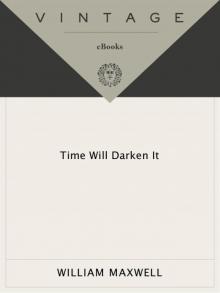 Time Will Darken It Time Will Darken It
Time Will Darken It Time Will Darken It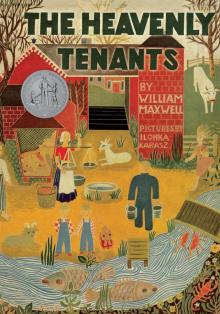 The Heavenly Tenants
The Heavenly Tenants They Came Like Swallows
They Came Like Swallows So Long, See You Tomorrow
So Long, See You Tomorrow The Folded Leaf
The Folded Leaf All the Days and Nights
All the Days and Nights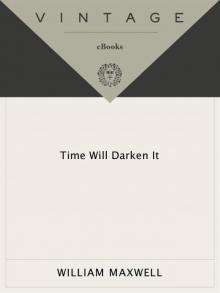 Time Will Darken It
Time Will Darken It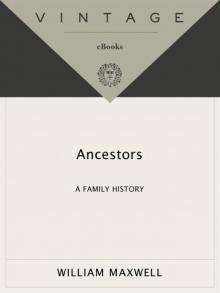 Ancestors
Ancestors